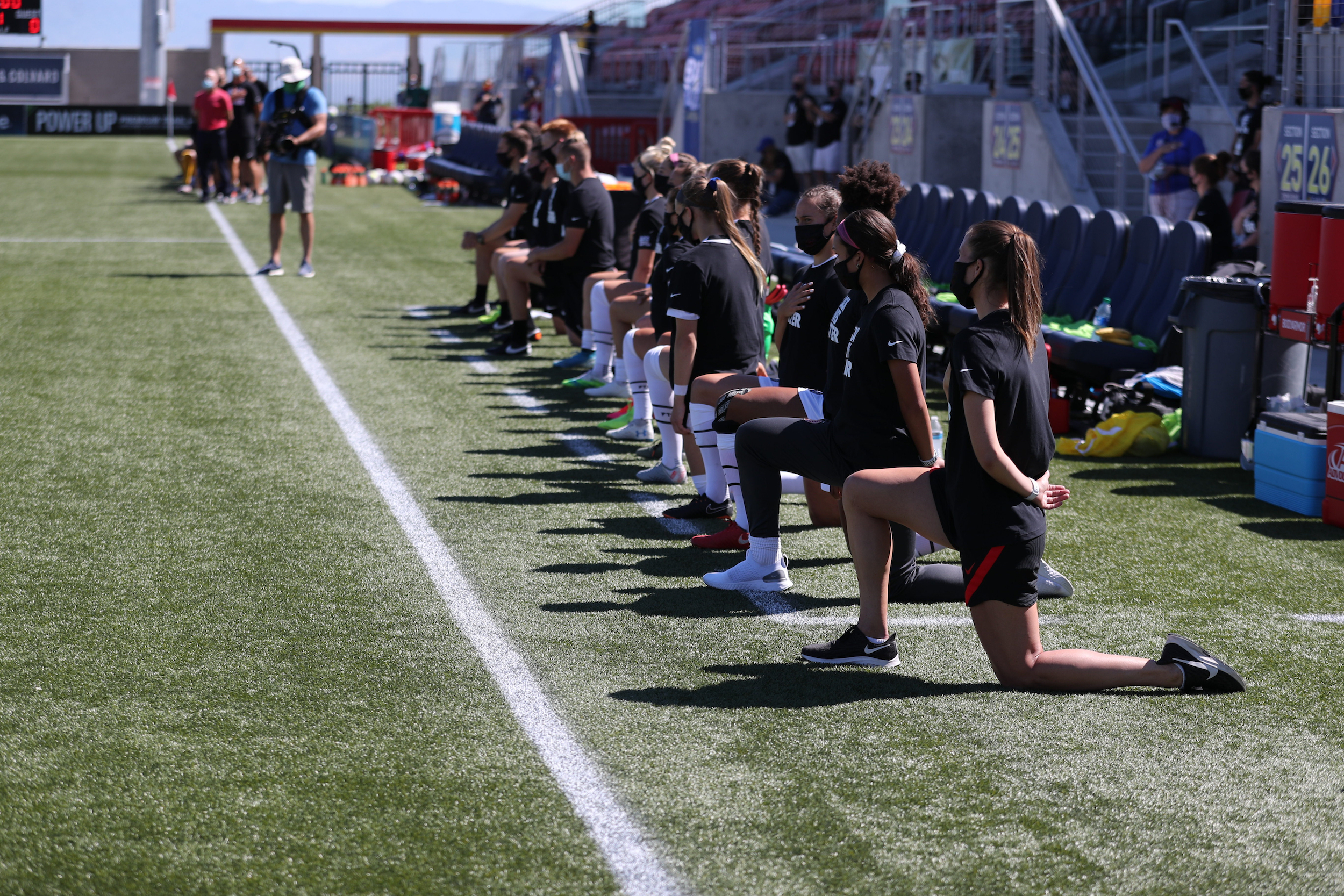There was a tweet today, from a certain talking head/professional troll in the soccer space, about how we’ve reached the point—four years after Colin Kaepernick lost his job for declaring his life mattered as much as those of his white teammates, four years after US Soccer prohibited its players from publicly standing with him—where athletes find it hard not to kneel for the anthem.
It’s an incredibly inane, annoying take, engineered to provoke outrage, and that’s why I’m not linking to it here. Still, I think it expresses a line of reasoning that appeals to broad segments of white America, and that line of reasoning is worth unpacking.
To get the obvious out of the way: being wrong about this issue, or any human rights issue, is not brave, merely evil.
To dig down a little further: if you were an alien just finding out about human customs, seeing the photo at the top of this article with no further context, you probably would come to the conclusion that human beings kneel on one knee before sporting events, and that not doing so is a breech of custom that takes a certain amount of courage. This is how our species is wired, for the most part; it’s difficult for us to do things other than what people around us are doing.
But that conclusion willfully erases context. These players didn’t all show up to the stadium and put on their Black Lives Matter shirts because they saw everyone else was wearing them; nobody scrambled to take a knee when the anthem started to avoid looking out of place. This was a concerted, intentional effort by players on both teams—across the whole league, even. They had talked about this. They had listened to each other. This was not an easy decision.
Conversations within teams didn’t all start right away. Simone Charley talked to The Equalizer about how hard it was, in the days after George Floyd’s murder, showing up to training and deciding to act like soccer mattered, and seeing how easily that decision came to her white teammates.
In Portland, it took a few days for those conversations to start—prompted by both Black and white players, but in particular, according to Sophia Smith, by AD Franch—and nobody should take for granted that they started at all. They happened because Black women on these teams did the work of talking to their white teammates about experiences those same teammates haven’t always been willing to listen to. This sport is as white as it’s ever been, and many of the players who kneeled today come from backgrounds that haven’t forced them to ever think critically about racism—that have, in fact, actively discouraged it.
So while it’s true there’s been a massive, sudden shift in public opinion over the last month on the acceptability of publicly opposing racism, don’t think for a second that this show of support for Black lives was a foregone conclusion. It wasn’t the brands that brought us here. It was Black players fighting for their lives and finally being heard by their teammates.
Furthermore, there are stark facts here, facts that will be recorded in history: these players took their stance in an empty stadium, but that empty stadium was on broadcast television. As the first American sports league to return to play. That’s the biggest platform women’s club soccer has ever been on.
The players knew what this platform meant. It meant they were opening themselves up to criticism that no doubt would also have been directed at male athletes doing the same thing, but which, no doubt, will be more vicious thanks to their gender. Have things changed since 2016, when Crystal Dunn didn’t kneel because she was afraid—for good reason—USSF might “rip up her contract“? Of course. But you’d have to be an alien to sincerely believe there won’t be backlash.
But this is what can’t get lost in the noise: the players also knew how significant the moment was, and they knew they had to take it, and use it to say something. It’s okay for us to be proud of that.
The danger is in letting this gesture exist as a mere gesture, and in deciding once the tournament is over that we’ve all done enough. It’s great that we’ve finally reached the point in this league where players can express solidarity against racism and police violence without fearing for their jobs. Now it’s on us, at home, to commit to standing with them and doing the actual work of putting an end to those things.

